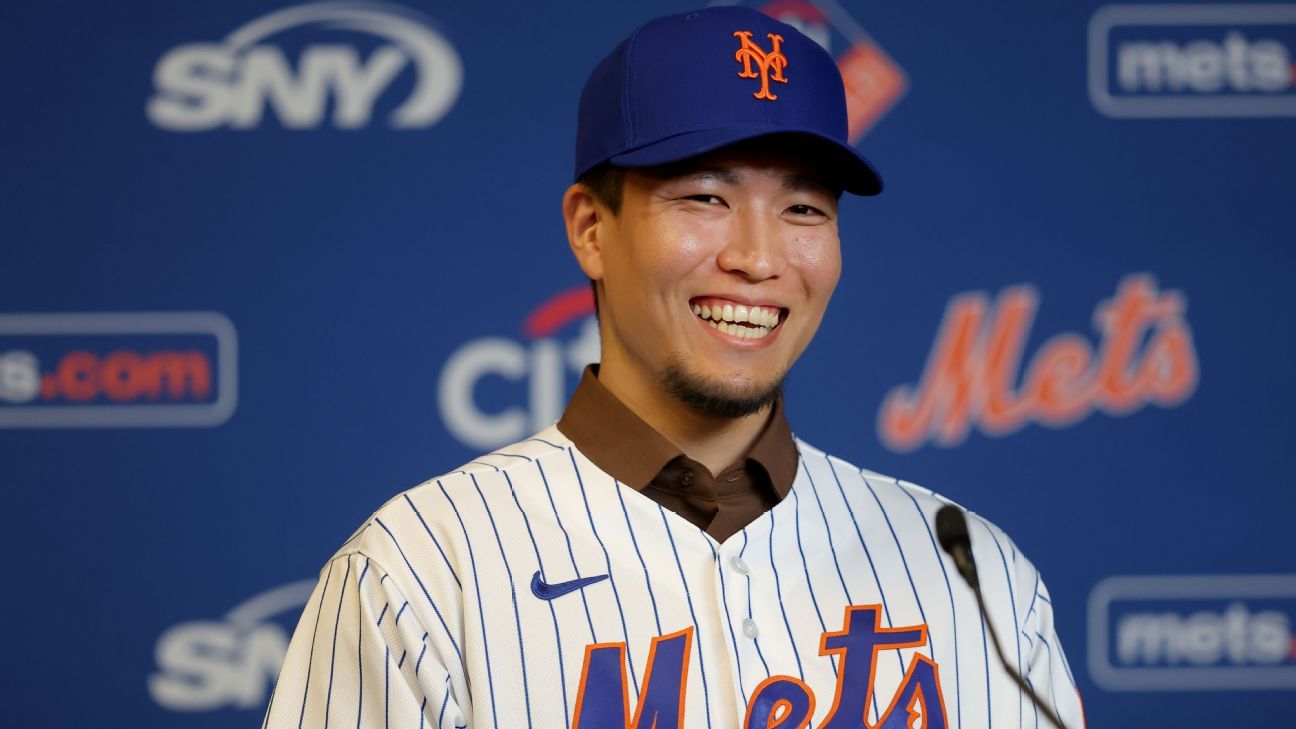NEW YORK — Kodai Senga hardly hesitated when asked who he is most looking forward to facing when he pitches for the New York Mets.
“The Phillies‘ lineup,” the Japanese right-hander said in English.
The Mets are excited for that showdown with the reigning National League champions, too.
Senga was officially introduced at a press conference Monday at Citi Field after finalizing a $75 million, five-year contract with the Mets, who will introduce Justin Verlander on Tuesday morning.
The outgoing 29-year-old opened his first news conference with a message in English to fans: “Hi, I’m Kodai Senga of the New York Mets. I’m very excited and happy to be in the Big Apple and join such a great team. Let’s go Mets.”
“He’s got a nice spirit to him,” general manager Billy Eppler said.
Senga will wear No. 34, which was previously worn by Noah Syndergaard from 2015 to 2022. He wore 41 — the number retired in Queens for Hall of Famer Tom Seaver — when he pitched for the Pacific League’s Fukuoka Softbank Hawks. He used social media to engage with fans and get input on a jersey number.
“I really felt the burning passion of the fans in New York, a lot of messages came through about the number as well,” Senga said through translator Mako Allbee.
Senga was 11-6 with a 2.25 ERA in 23 starts last season. He is known for his “ghostfork” pitch, described as a forkball that drops down to hitters like a split-fingered fastball at times. Senga has been compared to Daisuke Matsuzaka, who was known for his “gyroball” when he joined the Red Sox in 2007.
“I’m excited to see it,” Eppler said. “I know the bottom falls out of it and comes out of the hand looking like a fastball. So, it’ll be interesting to see how he acclimates because let’s not forget that there’s a lot of acclimation that comes with a pitcher coming from the NPB or any foreign league.”
After being drafted as a developmental player in the Pacific League, Senga was 87-44 with 2.59 ERA in 11 seasons. He was a three-time All-Star and a five-time Japan Series winner and led the league in strikeouts twice while also pitching a no-hitter in 2019.
In the Japan Series, Senga was the Game 1 starter in four straight seasons as the Hawks won four straight titles.
“It was a bit of a separator,” Eppler said of Senga’s championship experience.
Senga also tossed three scoreless innings in two outings to help Japan win a gold medal at the Olympics last year, allowing one hit and striking out six with two walks.
Senga was signed along with Jose Quintana and Verlander to replace the three 2022 Mets starters who signed elsewhere: Jacob deGrom went to Texas, Taijuan Walker inked a deal with Philadelphia and Chris Bassitt joined Toronto.
The deal for Senga is part of the $476.7 million the Mets have spent for seven free agents. Besides adding Senga, Verlander and Quintana, New York also retained center fielder Brandon Nimmo and closer Edwin Diaz, signed reliever David Robertson and reached an agreement with catcher Omar Narvaez that is pending a physical.
Senga can opt out of the deal after the 2025 season if he pitches a total of 400 innings from 2023-25. The contract contains a $15 million option for 2028 the Mets can exercise if Senga does not opt out and does not have Tommy John surgery or a right elbow injury that causes him to go on the injured list for more than 130 consecutive days.
New York’s rotation also includes veteran Carlos Carrasco. New York picked up his $14 million option for next season after the 35-year-old right-hander went 15-7 with a 3.97 ERA.
David Peterson and Tylor Megill, both 27, provide depth, and the Mets could deploy both in their rotation if they opt to occasionally push back Senga, who has never thrown more than 180 1/3 innings.
“It will be something that we discuss at times, but I think the schedule will drive it more rather than launching a six-man rotation,” Eppler said.
Senga will become the 14th player born in Japan to appear in a game for the Mets. That’s the most of any major league team, the club said.
